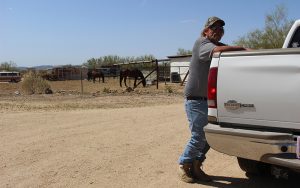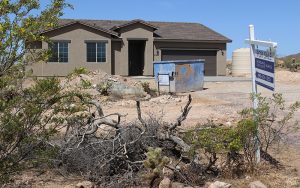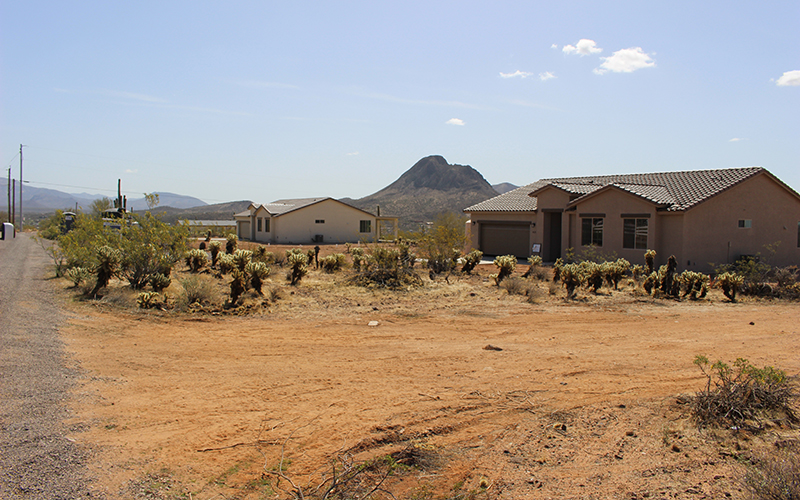NEW RIVER – Ron Bentley has lived in New River since 1984. Back then, his was the only house on the hill.
“Actually, when we first moved here, the deer would come and eat hay scraps along the fence line,” he recalled on a Sunday in April. “I haven’t seen a deer out here in 10 years.”
Fewer deer, but many more neighbors.
“Now there’s 23 homes up here on the hill. Well, soon as they finish those four, there’ll be 27.”
Bentley is referring to four new homes built on 1-acre lots just north of his home. But these houses and the land they sit on have vexed Bentley and his neighbors for more than a year.

Ron Bentley has lived on his New River property since 1984. (Photo by Bret Jaspers/KJZZ)
Arizona is known for strong property rights, with minimal regulation on home building. That’s especially true in unincorporated areas of Maricopa County, such as New River. But these residents want stronger enforcement of the rules that do exist.
The episode started when they got wind that a 10-acre chunk of land was being sold.
“Then we started digging into who actually owned the property, and found out that the two 5-acre parcels were owned by two different LLCs,” Bentley said.
LLCs – limited liability corporations – can give business owners privacy and shield them from liability. Ron Bentley and his neighbors – and later, KJZZ – found a web of LLCs related to the 10-acre parcel, often with common addresses and names. Property surveys for the two 5-acre parcels had one common LLC listed as the owner. Meanwhile, property deeds for the two 5-acre parcels listed separate LLCs as the owners.
Bentley suspected they were planning 10 houses on the 10 acres. “It was called working in concert to get around subdivision laws,” he said.
In unincorporated Maricopa County, as well as in much of Arizona, a subdivision is six lots or more. Land use lawyer Susan Demmitt, a partner at Gammage & Burnham in Phoenix, said companies can make more money if they skirt the requirements of the subdivision process, including infrastructure needs and assured water supplies.
“All of those sort of standard things that come with a true subdivision, if you’re able to avoid that, then you’re able to get from A to Z much more quickly, efficiently, and (in a) less costly manner.”
Mike DeMore at Morgan Taylor Homes, the developer, declined to comment for this story.
New River residents are particularly sensitive to development. The community has had a water crisis since wells began drying up in the past few years. A temporary solution should be in place by the end of July. Overdevelopment is exacerbating the problem, residents say.
Demmitt and others note that Arizona has a long history of deferring to private property rights.
“But it does present a huge opportunity for abuse of the system when you’ve got large tracts of land that over time just get divided and divided and divided and you don’t have a city water (or) sewer system,” she said.
Bentley and his neighbors called Maricopa County Planning and Development when the developer started work without a permit. Construction paused, then restarted after it came into compliance. But that’s a permitting issue. If a web of LLCs owns various deeds for a larger tract of land, county officials can’t stop them.
“The counties only have the authority that the state grants to us,” said Carol Johnson, director of Maricopa County Planning and Development. “We don’t have any authority until after the fifth lot has already been created. So when it’s six lots or more, that triggers the subdivision, and then our subdivision ordinance comes into play.”
What’s more, Johnson’s code-enforcement division has only five staff members to oversee the county’s 9,224 square miles.
According to an Arizona law passed in 2010, counties can review plans for five or fewer lot splits, but they can’t deny approval. Johnson said Maricopa County elected not to review splits because they couldn’t do anything about it anyway.

Neighbors of the new homes in New River have been pushing county and state officials to look into possible schemes to avoid subdivision rules. (Photo by Bret Jaspers/KJZZ)
Ultimately, violations of the subdivision law are investigated by the Arizona Department of Real Estate. Bentley and his neighbors complained to the real-estate department and provided documents, surveys and deeds. The department eventually launched an inquiry into the Morgan Taylor Homes development in New River.
Louis Dettorre, deputy commissioner, couldn’t comment on the active case. But he said the real-estate department has renewed efforts to meet regularly with Maricopa County officials.
“To have a discussion to say, let’s interact with each other,” Dettorre said. “Let’s share information as we move forward and try to be proactive about that.”
Dettorre said citizen complaints are a big part of the department’s investigation process.
Bentley thinks public officials, not him and his neighbors, should be doing the legwork.
“If it’s ADRE’s rules to enforce, then I don’t think the citizen should have to go to the extent of what we’ve gone through to make people live by the rules,” he said.
Work on a fifth house has been paused as the county reviews a second permit violation. But again, that doesn’t solve the subdivision question.
Bentley is worried that without action on that, four houses will turn into 10, one parcel at a time.
This story is part of Elemental: Covering Sustainability, a new multimedia collaboration between Cronkite News, Arizona PBS, KJZZ, KPCC, Rocky Mountain PBS and PBS SoCal.
